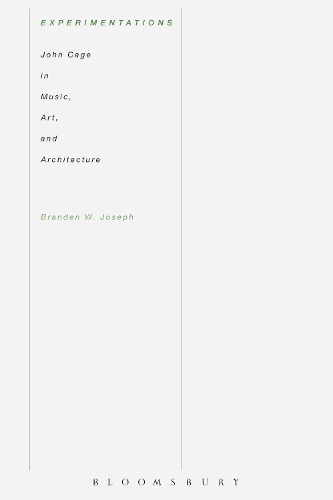
Experimentations: John Cage in Music, Art, and Architecture
(Paperback)
Available Formats
Publishing Details
Experimentations: John Cage in Music, Art, and Architecture
By (Author) Branden Wayne Joseph
Bloomsbury Publishing PLC
Bloomsbury Academic USA
11th August 2016
United States
Classifications
Tertiary Education
Non Fiction
Composers and songwriters
780.92
Physical Properties
Paperback
232
Width 150mm, Height 226mm, Spine 14mm
340g
Description
Experimentations provides a detailed historical and theoretical analysis of the first three decades of experimental composer John Cages aesthetic production (ca. 1940-1972). Paying particular attention to Cages inter- and cross-disciplinary engagements with the visual arts and architecture during this period, the book sheds new light on some of Cages most controversial and influential innovations, such as the use of noise, chance techniques, indeterminacy, electronic technologies, and computerization, as well as upon lesser known but important ideas and strategies such as transparency, multiplicity, virtuality, and actualization. Ultimately, it traces the development of Cages avant-garde aesthetic and political project as it transformed from the emulation of historical avant-garde precedents such as futurism and the Bauhaus, to the development of important precedents for the post-World War II movements of happenings and Fluxus, to its ultimate abandonment in the aftermath of problems encountered in the vast, multimedia composition HPSCHD (1967-69).
Reviews
Branden W. Joseph's formidable Experimentations: John Cage in Music, Art and Architecture throws open the terrain [of Cagean studies] once again. * The Wire *
Branden Joseph gradually unfolds the role of chance, transformation, performativity and transparency in music, and provides an interesting multi-layered understanding of the latters intercourse with other disciplines ... The book provides an innovative understanding of the examined ideas that remains open, allowing for other disciplines to enter into the suggested discourse ... In this way Joseph offers to artists and architects valuable tools to work on the further development on the role of tracing, documenting, scoring and attuning in the performative understanding of their areas. * The Journal of Architecture *
Experimentations: John Cage in Music, Art, and Architecture is a brilliant and vital critical contribution to the growing body of art historical scholarship on John Cages multidisciplinary legacy. The readymade Cage of chance and silence is replaced by a rich and nuanced narrative of a compositional practice nourished by its evolving and often conflicted exchanges with the artistic, architectural and political avant-gardes. * Ina Blom, Professor, Department of Philosophy, Classics, History of Art and Ideas, University of Oslo, Norway *
With great musical and historical sensitivity Joseph unpacks John Cages struggles, on the one hand, with Beethoven, Schoenberg, Stockhausenthe whole weighty European musical tradition, and on the other, with changing notions of experimentation and the avant-garde. What emerges is an artist who places music in the service of remaking the entire institution of art. Joseph succeeds in writing a brilliant book that is equally captivating for musicians and art historians. * Alexander Rehding, Professor of Music, Harvard University, USA *
...Experimentations: John Cage in Music, Art, and Architecture provides its reader with an overview of Branden W. Josephs two-decade engagement with John Cage and represents some of the most intellectually rigorous writing about the composer nuanced and important. * Critical Inquiry *
Author Bio
Branden W. Joseph is Frank Gallipoli Professor of Modern and Contemporary Art at Columbia University. He is the author of four books, including Beyond the Dream Syndicate: Tony Conrad and the Arts after Cage (2008) and Random Order: Robert Rauschenberg and the Neo-Avant-Garde (2003), which appeared in French translation in 2012.
